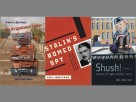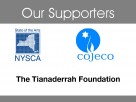TO LAUGH OR NOT TO LAUGH - a talk by Emil Draitser
Event Venue:
Hunter CollegeRoom B126-HW
Event Date:
Thursday, March 23, 2017 | 5:30 - 8:30 PMPresented in English
About the talk: A quarter of a century has passed since the collapse of the Soviet Union, the longest lasting totalitarian society in modern history. While many aspects of the system are known, there are still many more of them to explore. For example, for many people in the West, the very notion of "Soviet satire" sounds like a contradiction in terms. Yet, this particular brand of journalism flourished in Soviet time. What a satirist could and what he couldn’t lampoon in the tightly controlled Soviet media? What would happen to him if he slipped? How could some form of anti-Soviet satire in open press still be possible? Based on his experience as a freelance contributor to the Soviet satirical field in his past, the speaker will address these and other related issues, as well as answer questions from the audience.
About the speaker: Under his pen name "Emil Abramov", Emil Draitser began his writing career by contributing satirical articles to leading Soviet periodicals, such as Crocodile, Literary Gazette, Izvestia, and Youth. In 1975, blacklisted for writing an article critical of an important official, he immigrated to the United States. He earned his doctorate in Russian literature from UCLA and, for the last thirty years, teaches Russian language and culture at Hunter College.
Of twelve volumes of his artistic and scholarly prose, both in Russian and English, the most recent titles are Na kudykinu guru: A Novel of Odessa, a biography of a real-life Russian James Bond, Stalin's Romeo Spy, and a memoir, Shush! Growing up Jewish under Stalin. (For more info, go to: http://www.emildraitser.com)
This literary event is organized in collaboration with St-Petersburg Global Trade House.
RACC’s programs and events are made possible in part by the New York State Council on the Arts with the support of Governor Andrew Cuomo and the New York State Legislature, Cojeco and Tianaderrah Foundation.

